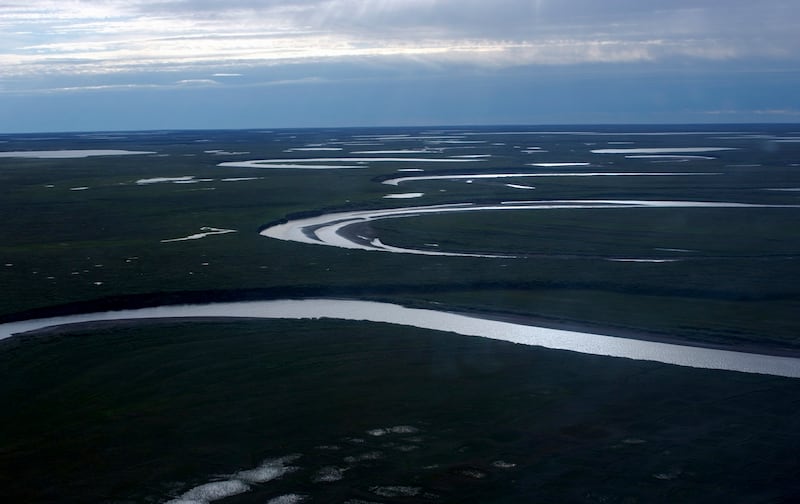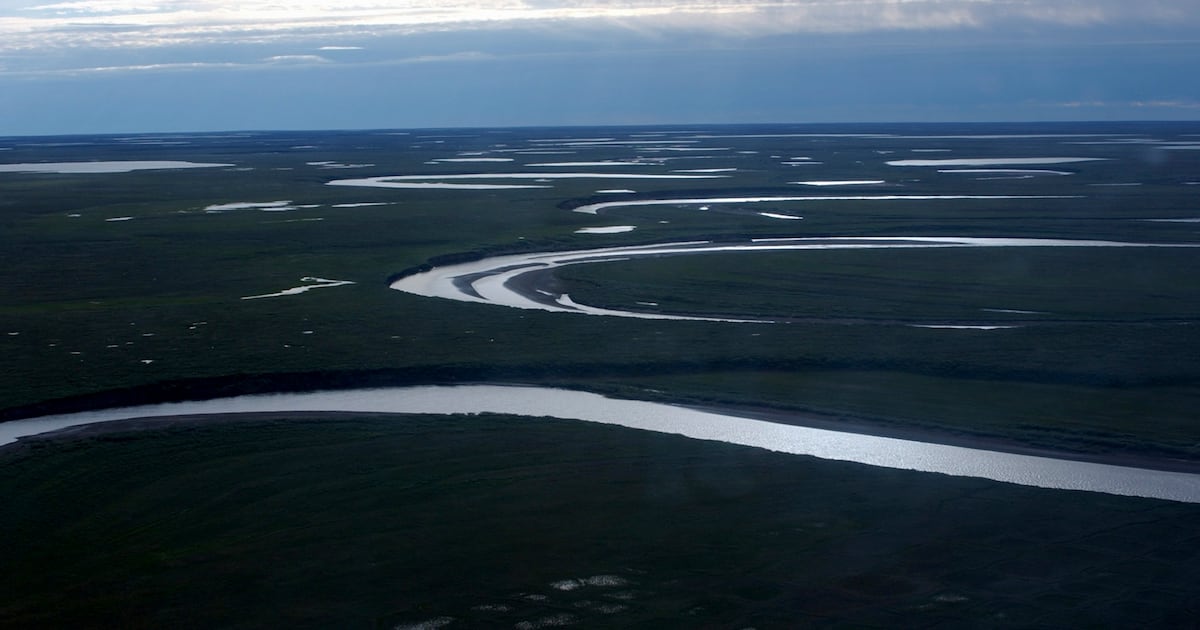 This July 8, 2004, photo provided by the United States Geological Survey shows Fish Creek through the National Petroleum Reserve-Alaska, managed by the Bureau of Land Management on Alaska’s North Slope. (David W. Houseknecht/United States Geological Survey via AP)
This July 8, 2004, photo provided by the United States Geological Survey shows Fish Creek through the National Petroleum Reserve-Alaska, managed by the Bureau of Land Management on Alaska’s North Slope. (David W. Houseknecht/United States Geological Survey via AP)
Alaska’s congressional delegation is taking steps to cancel a Biden-era land-use plan for the National Petroleum Reserve-Alaska that they say hurts prospects for future oil development there.
The 2022 Integrated Activity Plan for the area, finalized under President Joe Biden, stripped millions of acres from potential drilling that had been allowed under a Trump-era plan.
The Indiana-sized reserve on Alaska’s North Slope has seen increased interest from oil companies in recent years after ConocoPhillips made its large Willow discovery there.
Alaska Republican Sen. Dan Sullivan introduced the resolution in the Senate that would use the Congressional Review Act to undo the management plan. It has been cosponsored by Republican Sen. Lisa Murkowski.
Alaska Republican Rep. Nick Begich sponsored similar legislation in the House.
The act’s use, and the effort to invalidate the plan, has drawn opposition from conservation groups, including from a group in Nuiqsut, a village near the North Slope oil fields.
The Congressional Review Act gives Congress a path to block rules issued by federal agencies. The Government Accountability Office determined this summer that the plan for the petroleum reserve qualifies as a rule under the act.
If Congress cancels the land-use plan, federal law prevents it from being “reissued in substantially the same form.”
Sullivan supports using the act to invalidate the Biden-era plan and prevent future administrations from reviving it, according to a statement from Devyn Shea, a spokesperson for Sullivan.
The Iñupiat residents of the North Slope provided extensive input into the plan for the reserve that was finalized in the first Trump administration in 2021, Shea said. That plan would have allowed oil and gas leasing on about 80% of the reserve.
The 2022 plan approved under Biden ignores the reserve’s purpose and Congress’ directive for responsible energy development there, Shea said. The reserve was established more than a century ago as an oil repository for the U.S. Navy.
The Biden plan effectively prevents oil and gas leasing in half the reserve, and prevents infrastructure development on millions of acres, Shea said.
“This severely limits economically viable development, undermining Alaskans who depend on these projects for jobs, essential services, and community self-sufficiency,” Shea said.
“While development is not appropriate on every acre of the NPR-A, the 2022 plan ignored the requirements of federal law, the voices of many who live on the North Slope, and the clear and repeatedly expressed opposition of the congressional delegation,” said Joe Plesha, a spokesperson for Murkowski.
Silver Prout, a spokesperson for Begich, said in an email that the move to block the 2022 plan is a “joint delegation effort.” Prout referred questions to Sullivan’s office.
Conservation groups argue that using the act to undo a land-use plan is unprecedented.
They say it’s part of a larger effort by the Republican-led House and Senate to halt certain land-use plans that apply to federally managed areas in Alaska, Montana and North Dakota.
The groups say the 2022 plan for the reserve was developed after an extensive public review process and is designed to help balance industrial development with protecting subsistence hunters and wildlife, including migratory birds, caribou and polar bears.
“If passed, the resolution would set a dangerous precedent not only for us but for all public lands nationwide,” said Rosemary Ahtuangaruak, head of Grandmothers Growing Goodness, a group based in Nuiqsut. “We will have serious impacts in not only Nuiqsut but throughout the Western Arctic communities, and on all of our wildlife and ecosystems.“
“Who is fighting for us if the Alaska delegation isn’t?” she said.
Matt Jackson, Alaska senior director for The Wilderness Society, said the proposal to undo the plan for the petroleum reserve seeks to erase input from Alaskans.
“Rolling back the Integrated Activity Plan would mean D.C. lawmakers are haphazardly throwing out the careful input of tribes and other local communities, scientists and even industry interests so they can make their own top-down decisions instead,” Jackson said.
The Alaska delegation is also proposing to stop a Biden-era land-use plan for the Central Yukon region, arguing that it set excessive limits on 13.3 million acres and would hurt access to critical minerals and other resources that could benefit the Alaskan economy.
Begich introduced the measure to halt the Central Yukon plan. It passed the House early this month by a vote of 215-210, with Democrats unified against it. It still requires Senate approval.
